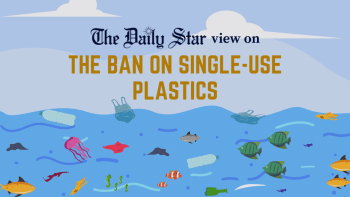Drowning in plastic, shall we just surrender to our fate?

A report published by this daily on Sunday shows, once again, just how widespread plastic pollution has become. At the Kulaura municipality in Moulvibazar, even a bit of rain is enough to flood the roads and cause waterlogging. This is because of the indiscriminate disposal of waste – including polythene, plastic packets, bottles, and cork sheets – into the town's drains. We have seen this scenario play out countless times across the country, with the disposed waste causing drainage systems to clog up, leaving little room for the excess water brought in by rain. Sometimes, the drains are cleaned up, but excavated wastes often end up back in because of the lack of proper waste management.
Given the state that it has reached, plastic pollution in the country demands urgent attention. In the absence of a proper disposal system, people often leave their waste anywhere they find vacant. Most, however, fail to realise how it contributes to clogging the drains, and how waste, in turn, lands in connecting rivers and other water bodies. This is not just harmful for the environment; when plastic enters the human body (in the form of microplastics), it can have all sorts of health consequences.
Unfortunately, the problem seems to getting worse day by day. According to a World Bank estimate, between 2005 and 2020, Bangladesh's annual per capita plastic consumption in urban areas tripled. Moreover, experts have found that of all the plastic wastes produced in the country in 2019, only 36 percent was recycled. The rest has been left to cause a havoc on the environment and every living thing in it. One cannot help but wonder whether Bangladesh has at all achieved anything from its "historic" ban on polythene and plastic bags in 2002. To this day, it remains an example of worthless legislation minus enforcement.
How pervasive plastic pollution has become can be understood from a joint study that revealed that at least 17 species of fish and three species of shellfish from rivers flowing through the Sundarbans were contaminated with microplastics. Plastic is definitely causing severe harm to the environment and the marine life. As such, the environment, forest and climate change ministry's March 27 announcement of banning single-use plastic across 6,500 square kilometres of the Sundarbans is a welcome one. But enforcement can again be an issue, so the authorities must ensure that such restrictions are placed everywhere and enforced without fail.
While the role of industries in accelerating the pollution of our environment is undeniable, it is also crucial that individual citizens are made aware of the danger of irresponsible waste disposal. We urge the authorities to conduct mass awareness programmes in this regard and ensure that there are adequate waste disposal points available in all city neighbourhoods. Without drastic changes in how we, individually and institutionally, treat plastic waste now, things will get worse in the coming days.


 For all latest news, follow The Daily Star's Google News channel.
For all latest news, follow The Daily Star's Google News channel. 






Comments